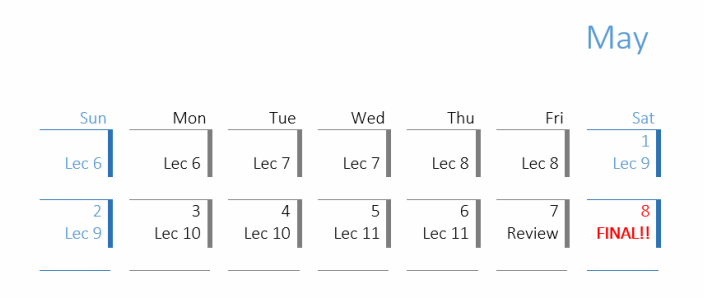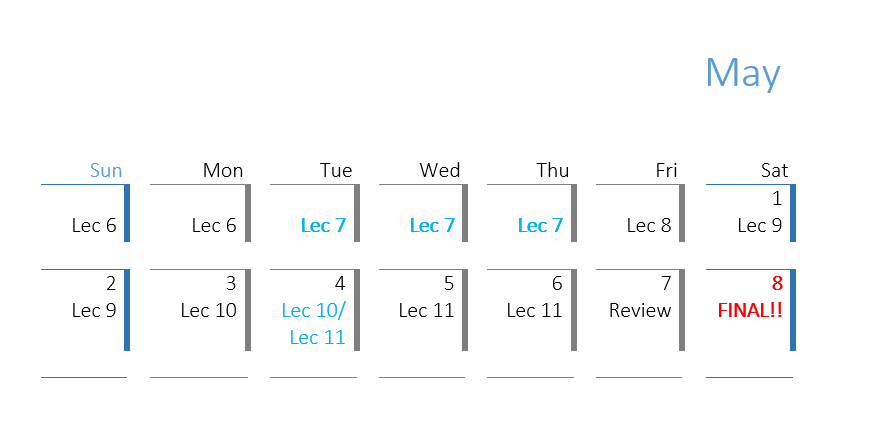|
By Julia Tartaglia We’ve all been there, Scientistas. You start out the semester full of determination and motivation. You tell yourself and anyone listening that this time, things will be different—you will attend every single lecture, do every single problem set on time, oh and of course, attend office hours. Then life gets in the way—extra curriculars, lab, parties, that little thing called sleep—and before you know it, you’re behind. Promising yourself every week that you’re going to catch up, you slowly fall more and more behind until suddenly, finals week is right around the corner. Suddenly you’re faced with hundreds of pages of unread material, problems, and lecture notes that stand between you and that beautiful A. Sound familiar? Before you fall into a full-fledged panic, I’m here to tell you that there is hope! If you take a calm and tactical approach to studying, with a bit of hard work you can still pull off a decent grade on your finals. Read on to find out three steps you can take to cram for your final exams. (Note, this technique to studying will also work if you aren’t behind, but want to best organize your study time.) STEP 1: CALENDAR BACKWARDS The first step to catching up is getting yourself on a schedule that will realistically allow you to cover all the material. Rather than studying blindly, spending hours rereading a single chapter with no aim in sight, you’re going to create a calendar. First, take a calendar and mark your final exam(s) on the calendar in big red letters. Count how many weeks (or days) you have left before the exam. This is your time variable (T). Now, take out your syllabus and count how many lessons of material you have left to cover for the final. This is your content variable (C). Follow this formula to create your schedule: Time _________ = # of days per material Content + 1 Let’s say you have 6 lessons that will be tested on the final, and you have exactly 14 days until your final exam. That means you should be covering one lesson every 2 days. This leaves you with 2 days to review all of the material for the second time. [14/(6+1) = 2] The 1 is added to the content to allow yourself extra time for a final review. Once you have your number of days per lesson blocked out, take your agenda or calendar and mark out the lessons you will be studying every day. STEP 2: PRIORITIZE CONTENT Not all content is created equal. In every subject, there are certain topics that are more important than others, and you will much more likely be tested on these topics. Now that you have a rough idea of how much time you have to spend studying for each lesson, go through your syllabus and notes and mark which lessons are more important, or more likely to be tested. Within each lesson, mark down which units are most important. Go ahead and adjust your master schedule, allowing yourself more time for the more important topics and less time for the less important topics. (Note: this doesn’t necessarily mean more time for the *harder* topics. Remember, you’re studying smarter, not harder. If there is a topic that is particularly challenging to you but will likely only show up in one question on the final, there is no need to spend a lot of time studying it.) STEP 3: PLAN OUT YOUR HOURS Now that you have your master schedule planned out, it’s time to plan out how you’re spending your days. When you’re cramming for a test, every hour counts. Every day, when you sit down to study, take a piece of paper and quickly jot down the number of hours left in the day. Then, take your study outline and map out how many hours you will spend on each topic. Be sure to block out times realistically for eating, sleeping, breaks, and other obligations you have to attend to. Doing this process will help you realize how important every hour is, and will help prevent you from wasting time day dreaming. 10 am – Topic 1 11 am – Topic 1 12 pm – Lunch 1 pm – Topic 2 2 pm – Topic 2 3 pm – Topic 3 4 pm – Gym 5 pm – Topic 3 6 pm – Dinner 7 pm – Topic 4 8 pm – Club elections 9 pm – Topic 5 10 pm – Topic 5 11 pm – Practice problems 12 am – Practice problems 1 am – Review notes from today 2 am – Sleep Pro Tips * Whenever you feel stuck on something, immediately go to a question help center, make an appointment with a TF or tutor, or ask a classmate for help. Though normally it is a good process to think through material on your own, when you’re cramming, this will only waste your time and throw you off of your schedule. * Find a study space where you work well and won’t be distracted. Every person has a different place where they work best. Be honest with yourself – is the school cafeteria really a good place to get work done if you know you are easily distracted by friends? Be sure to go to your ideal study space, whether that be a café, your room, or a library. * Use “empty time” to review. Have a long daily commute, a meeting that doesn’t require you to pay attention, or a long shower? Use idle, empty time to review flashcards and notes, or try free – recalling formulas, concepts, or definitions in your head. This is perfect time to reinforce the material and make it stick even more. So there you have it! Don’t waste a minute more – let’s get studying! Have another tip for how you cram for finals? Share it in the comments!
2 Comments
My best piece of advice is if you are cramming for an exam (not trying to finish a term paper) make sure you take some time to sleep. It greatly improves your recall abilities. It also helps to flip through flashcards right before bed as those facts will be encoded into your long term memory without time for you to forget them before falling asleep. If you've got a term paper, however, grab that energy drink and write on 'til dawn!
Reply
Shubham
2/11/2021 12:55:57 pm
Thank you very much
Reply
Your comment will be posted after it is approved.
Leave a Reply. |
Education BlogAbout ScientistaSubscribe!NEW!New PostsWhat's HotClick to set custom HTML
You Might Like...
Connect With UsLatest tweets |
The Scientista Foundation, Inc. All Rights Reserved © 2011-2021 | Based in NY | [email protected]
The Network for Pre-Professional Women in Science and Engineering
The Scientista Foundation is a registered 501(c)(3) -- Donate!
The Network for Pre-Professional Women in Science and Engineering
The Scientista Foundation is a registered 501(c)(3) -- Donate!





 RSS Feed
RSS Feed









